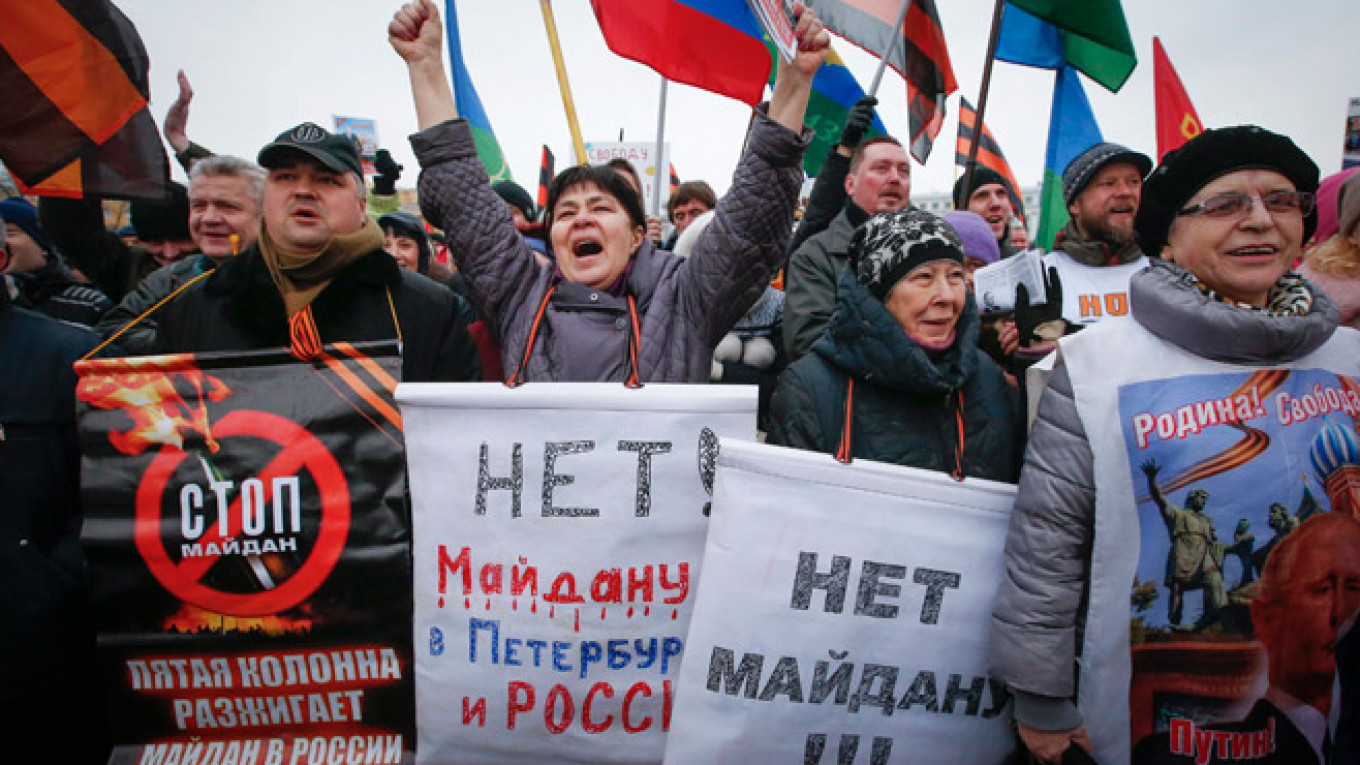A so-called "Anti-Maidan" march was held last weekend in the center of Moscow. It coincided with the anniversary of revolutionary events in Maidan Square in Kiev one year ago. Demonstrators wanted to show that they would not let the same thing happen in Russia. Watching the event on Russia's state-controlled television, one large banner figured prominently in the coverage. It read, "We are not MaiDOWNS."
"MaiDOWNS" — a tactless reference to the Ukrainian revolution and a person with Down syndrome — is a bit of slang that long ago took root among pro-Kremlin Internet trolls. If any foreign readers were unaware, the term "Down" as used in Russia means "absolute idiot" or "imbecile" and carries a very negative connotation.
Language reflects the condition of society. If a protestor carries a sign showing an image of a black president and the word "monkey" below, that person is clearly intent on offending others with racist statements. And anyone who would insult others by comparing them to a person with Down syndrome must sincerely believe that Down patients are unworthy of our respect and represent the refuse of society.
Maternity ward workers regularly persuade mothers who give birth to children with Down syndrome and other defects to give their babies over to the state to be held in special institutions. The statistics are lamentable: More than half of Russian children born with Down syndrome die within their first year.
An unenviable fate awaits the rest: They have no hope for adoption and will spend the rest of their lives as virtual prisoners. I have seen that whole horrible picture with my own eyes because my wife and I regularly visited one such orphanage in Moscow.
As a result, we adopted a boy from the orphanage whose illness, fortunately, is less severe. Parents from the United States used to adopt Russian children with illnesses or disabilities, but the Kremlin authorities put a stop to that, calling it unpatriotic.
I am friends with an ordinary Italian couple who adopted a boy named Vitya in the Siberian city of Kemerovo two years ago. Just three days after they took him home, the Kemerovo authorities passed a law abolishing all foreign adoption.
Vitya was one of the lucky ones. The Russian orphanage staff had considered him mentally retarded and a hopeless idiot, and nobody even tried to teach him to speak until he was five years old. The staff gave him less to drink so that he would urinate less frequently. As a result, whenever he was thirsty, he would scoop water from the toilet bowl with his cupped hands. His adoptive parents had difficulty breaking him of that habit.
Just after the couple gained court approval for the adoption, a young female court clerk approached them and said, "Admit it, you're only adopting him for his organs, right?"
It turns out that the young woman had read a story in a Russian newspaper claiming that foreigners adopted Russian children with medical problems in order to sell their organs to the thriving black market for organs in the West.
Thank God, Vitya has almost recovered from his mistreatment. Complete recovery is impossible, but at seven years old, he has finally begun to speak. That is largely due to the herculean efforts of his adoptive parents and the Italian medical system. It is terrible to even imagine what fate would have awaited Vitya in his homeland.
It was President Vladimir Putin's spin doctors that coined the word "MaiDOWN," and I winced every time I encountered it on the Internet. But now I have seen that same word emblazoned on a huge banner carried in downtown Moscow.
In Hitler's Germany, the authorities systematically eliminated children with Down syndrome as part of the Action T4 euthanasia program. Putin's Russia will never resort to such measures: It will kill those children with indifference and inhumanity.
Andrei Malgin is a journalist, literary critic and blogger.
A Message from The Moscow Times:
Dear readers,
We are facing unprecedented challenges. Russia's Prosecutor General's Office has designated The Moscow Times as an "undesirable" organization, criminalizing our work and putting our staff at risk of prosecution. This follows our earlier unjust labeling as a "foreign agent."
These actions are direct attempts to silence independent journalism in Russia. The authorities claim our work "discredits the decisions of the Russian leadership." We see things differently: we strive to provide accurate, unbiased reporting on Russia.
We, the journalists of The Moscow Times, refuse to be silenced. But to continue our work, we need your help.
Your support, no matter how small, makes a world of difference. If you can, please support us monthly starting from just $2. It's quick to set up, and every contribution makes a significant impact.
By supporting The Moscow Times, you're defending open, independent journalism in the face of repression. Thank you for standing with us.
Remind me later.






